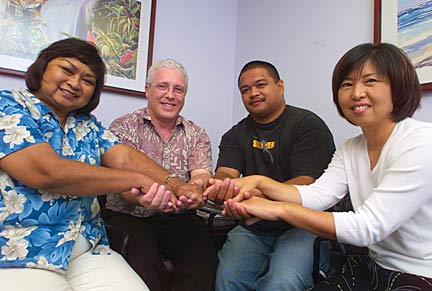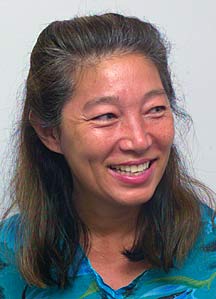
|
Isles’ first paired
kidney exchange
creates lasting bonds
Two Oahu women are doing
well after getting a kidney
from each other's relative
An unusual exchange of kidneys has created a lifetime bond among a Mililani couple, a Wahiawa woman and her son in Waialua.
Chad Jumawan, 33, wanted to donate a kidney to his mother, Loretta Respicio, 59, and Kenneth Eide, 50, wanted to give one of his kidneys to his wife, P.C., 45.
Their kidneys didn't match their loved ones, but Jumawan's kidney matched P.C. Eide's and Kenneth Eide's matched Respicio's.
So after two years of "looking over and over again at donor after donor," Cathy Bailey, living donor evaluation coordinator at the St. Francis Medical Center Transplant Institute, worked out a paired exchange -- the first in Hawaii.
![]()

![]()
Cathy Bailey: Says most people are willing to donate an organ to a loved one
About 5 percent of people die of kidney disease every year waiting for a match for a transplant, said Dr. Whitney Limm, surgical director of the Kidney Transplant Program.
However, he said, "We don't usually look at it (a transplant) as an effort to prolong life but as an effort to improve the quality of life."
P.C. Eide had been on transplant lists in five states, including 10 years on the list here with a chance of finding a kidney match about "one in 10,000 if everybody in the world donated." She was on dialysis for three years.
"Her situation was extremely unique," Bailey said. "I don't know if she realizes how lucky she was."
Eide has B type blood, for which the average wait is seven years, Bailey said. Additionally, Eide has antibodies, which she got when she was pregnant 6 years ago.
"We know from testing the blood if we took Kenneth's kidney and gave it to her, her body would attack it because of antibodies," Bailey said. Her three sisters weren't a match and the same would occur with about 70 percent of the population, Bailey said.
Respicio, who retired in 2002 from the state Tax Department, had been on dialysis six years and on the wait list for four years. Her blood type is O.
Jumawan, who often took his mother to the hospital for emergencies, said he and other family members tried unsuccessfully to donate a kidney to her three years ago. "I got tired of seeing my mom sick already and I just wanted to go the extra mile to help out.
"It was just a bonus to see that I could help someone else out," he added. "The first time I met her (P.C.) I was glad seeing her happy."
The donors and recipients chatted and laughed like old friends over doughnuts supplied by P.C. during a recent checkup at St. Francis.
"It's great to meet you," said Kenneth Eide, greeting the woman who received his kidney. "I'm glad you're feeling good."
"I just want to thank you so much," Respicio replied. "Your kidney is helping me. It's working real well on me."
P.C. also expressed her gratitude to Jumawan. "He loves his mother so much he was willing to give up a part of his body. It is very, very generous of him."
Jumawan is still recovering from an ankle injury and surgery after a head-on auto collision last August. He said he was "real scared" about the kidney operation but "the transplant team really stuck by me all the way and made me comfortable."
"I'd do it again in a minute," said Kenneth Eide, whose only previous experience with surgery involved his tonsils. "I think most families would jump at it if they had an opportunity."
He retired from the Air Force after 25 years and now works for the Navy coordinating tactical data links for coalition forces in Asia.
He was back at work part time two weeks after the operation and was traveling again within four weeks. He and their son Michael just returned from Japan, where they climbed Mount Fuji.
P.C. Eide said she felt very tired all the time after her pregnancy and her doctor sent her to a nephrologist, who found both her kidneys had failed 80 percent. They don't know the cause of her kidney disease, she said.
When her husband was stationed on Okinawa in the Air Force, she had a lot of complications and had to be flown to Honolulu every three months to see a doctor, she said.
She said she tried to take care of herself, eating right, walking, running, doing aerobics and taking $200 to $300 worth of medicine a week, but she still "dragged all these years. I didn't want to be in dialysis because I had a little child."
She said her husband and son suffered because she was always too tired to do anything with them.
When Bailey talked to her two years ago about a kidney exchange, she said, "My husband was willing to trade with anybody who will be compatible with my kidney." Their son also wanted to be her donor but was too young, she said.
Respicio said she began having problems 20 years ago because of high blood pressure and a doctor warned that she would end up on a kidney machine.
She believes her medical problems stemmed from her stressful job in tax collections, plus stress at home.
Limm said a lot of preparation and apprehension were involved in performing the four surgeries because "the success for the next one depends on the success of the previous one.
"We made sure each person was OK as we were going ahead with the next step," Limm said. The doctors also continued talking to the donors, making sure they were still committed to donating their kidneys, he said.
Respicio said she got her new kidney for her birthday, May 15.
"Those are my stars," Bailey said. "They made a lot of sacrifices to help their loved ones."
450 kidney patients
await transplants
The average wait for Hawaii
patients is 61 months, far
longer than on the mainland
Cathy Bailey shuffles pink and yellow name tags on a bulletin board looking for kidney donors to match patients waiting for transplants.
She has no computer yet to store data for potential trade matches, said Bailey, living donor evaluation coordinator at the St. Francis Medical Center Transplant Institute.
When donors don't match an intended recipient's blood type, she suggests two options: One is to donate to someone on behalf of a loved one, and the loved one goes to the top of the list. The other is a paired exchange. The latter -- two kidney removals and two transplants -- was done for the first time in Hawaii on May 13.
Bailey said most people are willing to donate to a loved one but become a little scared when asked, "Would you donate to someone else so your husband can get a kidney?"
Hawaii has 450 patients on the waiting list for kidneys.
The average waiting time for an organ here is 61 months compared with 36 months on the mainland, said Dr. Whitney Limm, surgical director of the Kidney Transplant Program at St. Francis Medical Center.
One reason is that kidney failure is common in Hawaii, he said. "Half of the people we place on the wait list have diabetes." The second is that Hawaii doesn't seem to have as many organ donors, he said.
The institute has had altruistic donors, willing to donate to a stranger, and living transplants are done from kidneys donated by family members or friends.
Limm said he advises against "altruistic nondirected donations," pointing out to such donors that they're consenting to an operation that offers them no medical benefit.
"I would donate to a family member or close friend," he said. "I would not donate in the setting of an altruistic nondirected donation to a complete stranger because there are some risks involved, and I have obligations to my immediate family."
Limm said it is his responsibility to make sure donors and patients are informed.
He said he views the psychologist as the donor's advocate, to make sure the patient has a good understanding of what she or he is committing to and that their motives are sincere. "And I have canceled surgery on advice of the psychologist."
Among advantages of living transplants, Limm said operations can be planned and scheduled and organs tend to be out of the body for a shorter time and work quicker after the transplant. The kidney sometimes is out of the body 12 to 22 hours in a cadaver transplant, he said.
Limm said medications are so good now that "in over 85 percent of cases, we can prevent rejection and when they reject, we have medications that can reverse the rejection.
"What we cannot control are the peoples' willingness to take the medications, so right now, if we lose a kidney because of acute rejection, it's because the patient has stopped taking the medications."
Those most likely to stop taking them are teenagers and people in their early 20s, particularly if they've never been on dialysis, he said.
The St. Francis team annually does about 50 to 60 kidney transplants, about 12 liver transplants and five pancreas transplants.
Hawaii's three-year survival rate, reflecting how well the kidneys are working after surgery, is 92 percent compared with 77 percent nationally, Limm said.
For more information about organ donations, call 547-6228.
E-mail to City Desk
[News] [Business] [Features] [Sports] [Editorial] [Do It Electric!]
[Classified Ads] [Search] [Subscribe] [Info] [Letter to Editor]
[Feedback]
